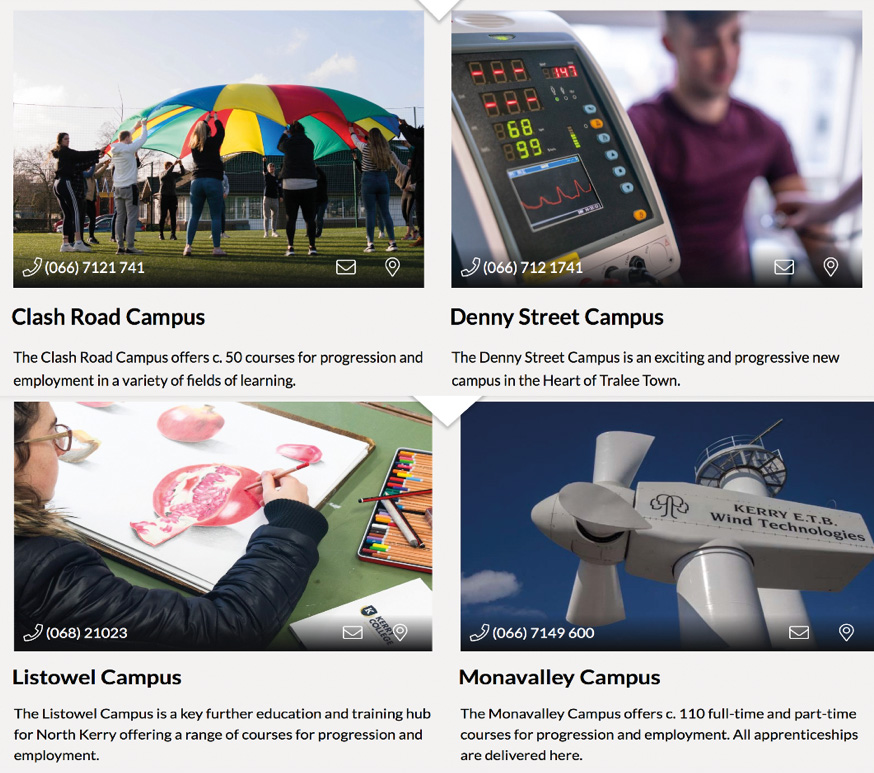


Further education and training in Kerry was delivered in disparate fashion until recent years, when it was decided to integrate provision into a single college across multiple campuses. This article describes the steps involved in planning and establishing an integrated FET college in Kerry, and outlines the benefits of the transformation.
Kerry Education and Training Board (ETB), established in July 2013, is the main statutory provider of education and training courses in County Kerry. On 1 January 2014, the training function was integrated into the newly established ETB as part of phase 1 of this national process. Further education and training (FET) courses were now being provided in the former VEC colleges and the former FÁS training centre. Similar courses were being offered in the two types of centre, but with different guidelines and course costs.
The need to rationalise was clear, and the timeline for moving from separate further education and training (FE&T) to integrated FET began.
From 2014 to 2018, during this transition, in many ways Kerry ETB presented a confused visual for learners across social and local media platforms. Kerry ETB centres and colleges were, in effect, competing with each other when marketing their full-time provision at levels 5 and 6 of the National Framework of Qualifications (NFQ). At this time, NFQ levels 5 and 6 and apprenticeships were delivered through the following model:
Kerry ETB management had a moment of realisation in August 2018 when it became clear that the transition phase was at its end and a new phase was beginning. This transformation phase meant moving from the old model for FET organisation and delivery at NFQ levels 3, 4, 5, and 6 by separate ETB centres and colleges, to a model that enabled the ETB to meet the needs of learners across the county in a much more integrated way.
The drive to move to an integrated FET approach was underpinned by the following:
In autumn 2018 the CEO and director of FET sat down with the manager of Kerry ETB Training Centre and the two PLC college principals to discuss the move from the traditional FE&T delivery to a new integrated FET model.
[ctt template=”1″ link=”bIeb3″ via=”yes” ]“In autumn 2018, the CEO and director of FET sat down with the manager of Kerry ETB Training Centre, and the two PLC college principals, to discuss the move from the traditional FE&T delivery to a new integrated FET model.[/ctt]
A document was compiled to address the transition, describing the steps to complete it effectively in the local Kerry ETB context. It set out a five-year pathway that would strategically change the structure of full-time FET provision by Kerry ETB. The cornerstone for this strategy was the ETB establishing an integrated FET college in Co. Kerry that would encompass the provision of the training centre and the PLC colleges.
Management identified the following key areas to establish an integrated FET college:
From late 2018 to June 2019, the management team worked diligently, engaging with stakeholders such as our funders SOLAS, the Department, staff, staff union representatives, learners, and the Kerry ETB Quality Assurance and Curriculum Development unit, in addressing each of these areas with a view to launching a pilot integrated FET college offering for September 2019. A milestone was reached when SOLAS agreed for the ETB to progress with the pilot.
As with any initiative involving significant change, staff buy-in was essential, particularly as staff teams transitioned from the ETB training centre and two PLC colleges to the new integrated college. The FET Staff Day in April 2019 was key, with much of the agenda devoted to these developments, setting out the vision and strategic direction with input from SOLAS.

Management could then set about naming the new entity, and consulted extensively with all involved. The name chosen, and universally accepted, was Kerry College of Further Education and Training. It has since been abbreviated by many to Kerry College, which is proving to be excellent for brand recognition across the county. County Kerry is our campus.
Three courses were chosen for the pilot approach to course planning and integration: Office Administration, Beauty Therapy, and Hairdressing. They were chosen because they were traditionally delivered from the ‘former’ Kerry ETB training centre and the respective PLC colleges.
On 1 August 2019, Kerry College of Further Education and Training was introduced to the public through a well-planned promotional campaign. Kerry College campus locations in Tralee and Listowel became a reality on 1 September. Much had been achieved by this stage:
A study visit in September 2019 to South West College, Omagh, with representatives from SOLAS was very informative for the next phase. It identified, much more deeply, areas that needed to be addressed in embedding the integration. Since then, Kerry College’s journey has continued unabated, with many positive developments:
In September 2020 the number of campus locations expanded to five with the Kerry College National Outdoor Education and Training Campus.
It is planned to continue this transformation cycle for Kerry College with the inclusion of further FET centres in Kenmare, Waterville, Cahersiveen, Causeway, and Dingle (traditionally these provide level 3 and 4 courses, with emphasis on progression pathways, outreach centre provision, etc.), the roll-out of school activation courses (transition year) for post-primary schools in Kerry, greater alignment with Youthreach, specialist training provision and literacy services, and expansion of evening and night-time provision.
2020/21 has been a challenging time for us all with the Covid-19 pandemic. Kerry College’s highly integrated nature has helped to address the challenges, underpinning management’s ability to respond to the ever-evolving situation in an agile, learner-centred way.
[ctt template=”1″ link=”7hXc3″ via=”yes” ]“It is planned to continue this transformation cycle for Kerry College with the inclusion of further FET centres in Kenmare, Waterville, Cahersiveen, Causeway, and Dingle…[/ctt]
In 2019 Kerry College had more than 2,800 beneficiaries across courses for progression, courses for employment, and apprenticeships, and around 1,230 learners enrolled on evening programmes. Enrolments for 2020/21, despite the current challenges, are very good, and the college is well positioned to realise the vision for FET as set out in the SOLAS FET Strategy 2020–2024, ‘Future FET: Transforming Learning’:
FET will provide pathways for everyone. It will empower learners to participate fully in society and to become active citizens, and drive vibrant and diverse communities. FET will become the smart choice for school leavers, employees looking to up-skill and learners at all stages of their lives, with future FET colleges recognised as dynamic, modern and high-quality learning environments. FET will prepare people for work and successful careers, facilitate progress through tertiary education, and equip its graduates for a lifetime of continual learning and development. In five years FET will have grown its profile, with FET colleges serving as beacons of learning within communities which are widely recognised as a major driver of Ireland’s next critical phase of economic and social development.
We look forward to continuing this transformational journey in making Kerry College a beacon of learning in the community across County Kerry, providing learners with lifelong opportunities in further education and training.
Copyright © Education Matters ® | Website Design by Artvaark Design